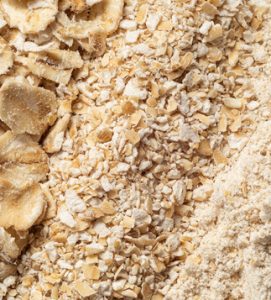New ACG Guidelines Suggest that Oats Can Cause an Immune Response in Some Celiacs
 American College of Gastroenterology has published updated guidelines for the evaluation, diagnosis and management of children and adults with celiac disease.
American College of Gastroenterology has published updated guidelines for the evaluation, diagnosis and management of children and adults with celiac disease.
- Kate Burba, healio.com/news/gastroenterology 1
OF NOTE: Although consumption of oats seems safe for most patients with CD, a subset of patients may be immunogenic.
Immunogenicity is the ability of a foreign substance, such as an antigen, to provoke an immune response.
[CONCERN: If even the purest, gluten-free oats can trigger an autoimmune response in some celiacs, causing a relapse, is it prudent to recommend that celiacs can safely partake? ]
The Canadian Celiac Association acknowledges that, “There are case reports of individuals with celiac disease relapsing from the consumption of pure, uncontaminated oats. Research suggests that intolerance to oats occurs but is quite rare. The mechanism for this intolerance is unknown at this time.” 2
Coeliac Australia’s current position on the suitability of oats for those with coeliac disease:
In accordance with the position of Food Standards Australia and New Zealand, oats are not currently recommended for people with coeliac disease. 3
“Celiac disease (CD) is defined as a permanent immune-mediated response to gluten present in wheat, barley and rye. CD has a wide spectrum of clinical manifestations that resemble a mult-systemic disorder rather than an isolated intestinal disease,” Alberto Rubio-Tapia, MD, director of the Celiac Disease Program at the Cleveland Clinic and assistant professor of medicine at the Mayo Clinic, and colleagues wrote in The American Journal of Gastroenterology.
“Current treatment of CD requires strict adherence to a gluten-free diet and lifelong medical follow-up.”
In this update to the 2013 ACG guidelines, Rubio-Tapia and colleagues evaluated various clinical practice statements including indication for screening, diagnostic strategies, the role of biopsy-confirmed diagnosis, general approach to management and adherence, preventive care and more.
An expert panel created eight updated recommendations, which include the following highlights.
- Multiple biopsies of the duodenum, which include one or two from the bulb and four from the distal duodenum, are necessary for CD diagnosis.
- Among patients who experience lack of clinical response or relapse despite adherence to the gluten-free diet, upper endoscopy with intestinal biopsies may be helpful for monitoring.
- Although consumption of oats seems safe for most patients with CD, a subset of patients may be immunogenic.
- Vaccination against pneumococcal infection is safe and effective and is “widely recommended” for all adults aged 65 years and older and smokers aged 19 to 64 years, as well as adults with underlying conditions.
- Patients with symptoms or evidence suggestive of malabsorption, including chronic diarrhea with weight loss, steatorrhea, abdominal pain and bloating, should be tested for CD.
- Current guidelines recommend testing for CD in children aged younger than 2 years include evaluation of tissue transglutaminase (TTG) and deamidated gliadin peptide, although TTG and endomysium antibodies may be less accurate among this subset of patients.
“These guidelines are established to support clinical practice and suggest preferable approaches to a typical patient with a particular medical problem based on the currently available published literature,” Rubio-Tapia and colleagues wrote. “When exercising clinical judgment, particularly when treatments pose significant risks, health care providers should incorporate this guideline in addition to patient-specific medical co-morbidities, health status and preferences to arrive at a patient-centered care approach.”
2 Canadian Celiac Association’s (CCA) Position Statement on Oats
Based on Health Canada studies, the CCA informs Canadians that, “the consumption of oats, uncontaminated with gluten from wheat, rye or barley, is safe for the vast majority of patients with celiac disease.”
The CCA recommends that celiacs introduce pure oats once they are stabilized on the gluten-free diet and their celiac antibody levels have normalized.
They also advise that since the fibre in oats is, “higher than the typical gluten-free diet. When adding oats to the diet, individuals may experience a change in stool pattern or mild gastrointestinal symptoms, including abdominal bloating and gas. These symptoms should resolve within a few days. ”
The CCA acknowledges that, “There are case reports of individuals with celiac disease relapsing from the consumption of pure, uncontaminated oats. Research suggests that intolerance to oats occurs but is quite rare. The mechanism for this intolerance is unknown at this time.”
3 Coeliac Australia’s current position on the suitability of oats for those with coeliac disease
Coeliac Australia’s current position regarding the suitability of uncontaminated oats (wheat free oats) is based on collective evidence from multiple studies over many years around the world that have assessed oat safety in coeliac disease. These have shown that most people with coeliac disease can safely consume oats. In accordance with the position of Food Standards Australia and New Zealand, oats are not currently recommended for people with coeliac disease.
However, some studies have also shown oats can trigger potentially harmful immune responses. Therefore, in accordance with the position of Food Standards Australia and New Zealand, oats are not currently recommended for people with coeliac disease. Coeliac Australia is awaiting the results of dedicated Australian research examining oats safety in coeliac disease. The findings from this study aim to inform current recommendations arounds oats ingestion by people with coeliac disease.













